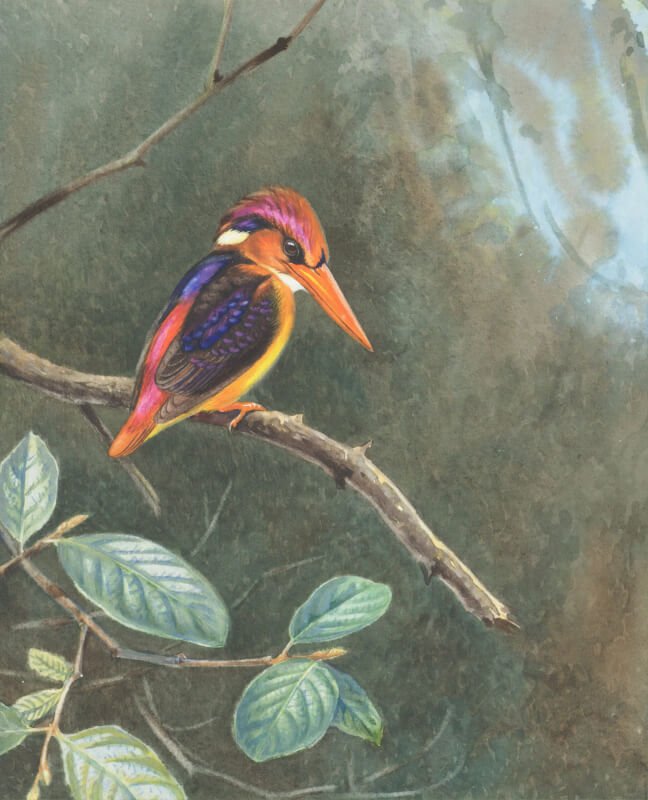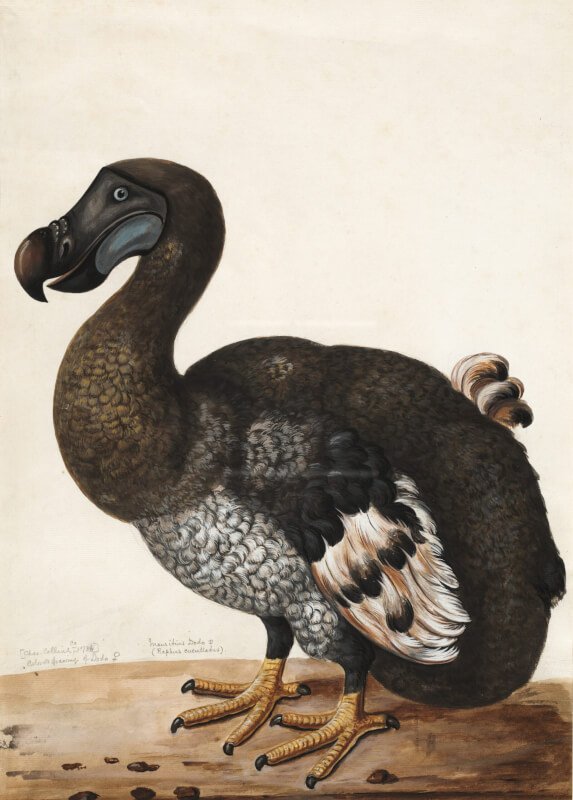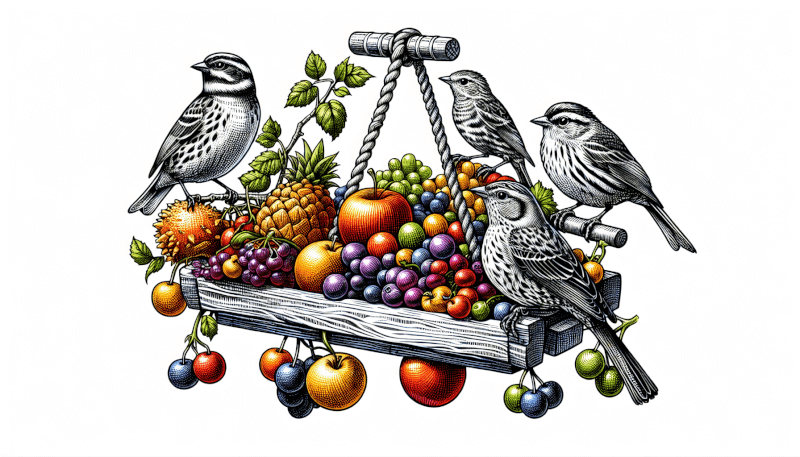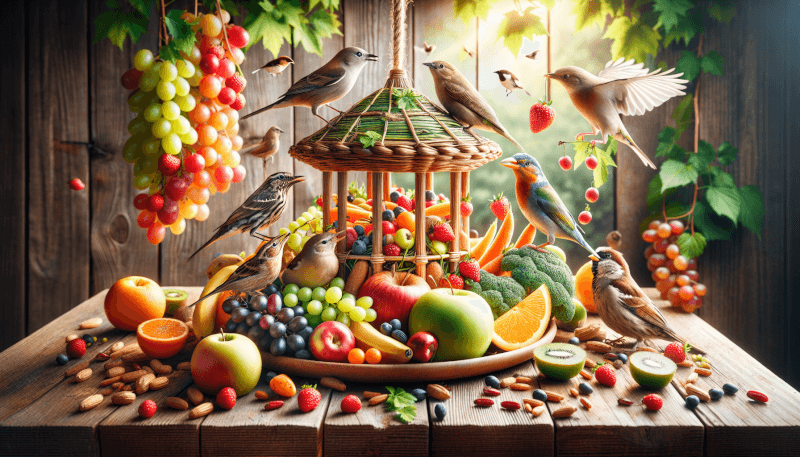Have you ever wondered if birds can safely eat fruits and vegetables? Well, the answer is yes! Birds can indeed enjoy a variety of fruits and vegetables without any harm. In fact, incorporating these nutritious foods into their diet can provide them with essential vitamins and minerals. However, it’s important to be mindful of certain fruits and vegetables that may be harmful to birds. By understanding which options are safe and beneficial for our feathered friends, we can ensure they have a well-balanced and enjoyable diet.

Introduction
Have you ever wondered if birds can eat fruits and vegetables? Well, the answer is yes! Just like us, birds can benefit from a diet that includes fruits and vegetables. In fact, incorporating these natural foods into their diet can provide them with important nutrients, improve their digestion, and even boost their immune system. However, it’s important to know which types of birds can eat fruits and vegetables, what the benefits are, and how to safely introduce these foods into their diet. So, let’s dive in and explore the world of birds and their love for fruits and vegetables!
Types of Birds That Eat Fruits and Vegetables
Omnivorous Birds
Some birds have an omnivorous diet, which means they consume both plants and other animals. For these feathered friends, fruits and vegetables are a vital part of their diet. Omnivorous birds include species such as crows, jays, and mockingbirds. These intelligent creatures have a diverse palate and can enjoy a wide variety of fruits and vegetables.
Herbivorous Birds
Herbivorous birds, on the other hand, primarily eat plants. They rely on fruits and vegetables as their main source of nutrition. Examples of herbivorous birds are parrots, toucans, and some species of finches. These colorful birds have evolved to extract nutrients from the fiber-rich plant materials and can thrive on a diet consisting mainly of fruits and vegetables.

Benefits of Fruits and Vegetables for Birds
Nutritional Value
Just like us, birds need a balanced diet to stay healthy. Fruits and vegetables provide essential vitamins, minerals, and antioxidants that are crucial for the overall well-being of our feathered friends. These natural foods contain a wide range of nutrients such as Vitamin A, Vitamin C, potassium, and fiber, which can help support birds’ growth, development, and immune function.
Improved Digestion
Fruits and vegetables are rich in dietary fiber, which aids in maintaining a healthy digestive system for birds. When birds consume these fibrous foods, it helps promote regular bowel movements and prevents constipation. Additionally, the fiber content in fruits and vegetables also helps to keep their beaks and digestive tract in good condition.
Boosting Immune System
Just like humans, birds can also benefit from the immune-boosting properties found in fruits and vegetables. The vitamins and antioxidants present in these foods help birds’ bodies fight off harmful pathogens and strengthen their immune system. By including fruits and vegetables in their diet, birds can build a robust defense system against various diseases.
Safety Considerations for Birds Eating Fruits and Vegetables
While it’s beneficial to introduce fruits and vegetables into a bird’s diet, it’s essential to be aware of several safety considerations to ensure their well-being.
Toxic Fruits and Vegetables
Not all fruits and vegetables are safe for birds to consume. Some may be toxic and harmful to their health. It’s crucial to familiarize yourself with the types of fruits and vegetables that are safe for birds and those that should be avoided. We will discuss this further in the upcoming sections.
Pesticide Residue
Birds can be more sensitive to pesticides than humans. It’s important to choose organic produce whenever possible or ensure that any fruits and vegetables you offer to your birds are thoroughly washed. This will help reduce the risk of pesticide residue, which could be harmful to their delicate systems.
Food Allergies and Sensitivities
Just like humans, birds can have food allergies or sensitivities. It’s important to observe your bird’s behavior and any changes in their health after introducing new fruits or vegetables into their diet. If you notice any adverse reactions such as itching, vomiting, or diarrhea, it may be an indication that your bird is allergic or sensitive to a particular food. In such cases, it’s best to avoid that specific food and consult a veterinarian if necessary.

Preparing Fruits and Vegetables for Birds
To ensure the safety and enjoyment of your feathered friends, proper preparation of fruits and vegetables is essential.
Washing and Cleaning
Before feeding any fruits or vegetables to your bird, it’s crucial to thoroughly wash and clean them. This removes any dirt, bacteria, or pesticide residue that may be present on the surface. It’s important to use clean water and avoid using any harsh chemicals or detergents as these can be toxic to birds. A gentle scrub or soak is usually sufficient to remove any impurities.
Cutting and Dicing
To make fruits and vegetables easier for birds to consume, it’s recommended to cut or dice them into small, bite-sized pieces. This not only prevents choking hazards but also makes it easier for birds to handle and enjoy their food. Additionally, cutting or dicing also allows for a more even distribution of the nutrients present in fruits and vegetables.
Popular Fruits and Vegetables That Are Safe for Birds
Now that we know the importance of fruits and vegetables in a bird’s diet and how to prepare them, let’s explore some of the most popular and safe options for our feathered friends.
Apples
Apples are a favorite fruit among birds. They are a great source of Vitamin C, fiber, and antioxidants. Just make sure to remove the seeds and core as they can be harmful to birds.
Bananas
Bananas are another bird-friendly fruit. They are easy to digest, provide essential nutrients like potassium, and are loved by many birds. Remember to peel the banana and offer it in bite-sized pieces.
Carrots
Carrots are packed with Vitamin A, which is essential for maintaining good eyesight in birds. You can offer small, grated pieces of carrots to your avian companions.
Spinach
Leafy greens like spinach are highly beneficial for birds. They are rich in Vitamin K, iron, and antioxidants, which support good health. Ensure that the spinach is thoroughly washed and offer it in small, chopped pieces.
Berries
Berries such as blueberries, strawberries, and raspberries are a delicious and nutritious treat for birds. They contain antioxidants and provide essential nutrients. Offer these berries in small, washed portions.
Broccoli
Broccoli is a fantastic vegetable option for birds. It’s packed with Vitamin C and other nutrients that help boost their immune system. Offer small, chopped florets of broccoli to your feathered companions.
Peas
Peas are another vegetable that birds enjoy. They are a great source of protein, fiber, and vitamins. You can offer fresh or thawed peas to your avian friends.
Oranges
Oranges are a citrus fruit that can provide birds with Vitamin C and hydration. Ensure that you remove any seeds and offer them in small, peeled segments.
Grapes
Grapes are a sweet and juicy treat that many birds love. They are a good source of hydration and provide essential nutrients. Offer grapes in small, halved portions to prevent choking.
Leafy Greens
Various leafy greens such as lettuce, kale, and Swiss chard can be included in a bird’s diet. These greens are packed with vitamins and minerals that contribute to their overall health. Offer washed and chopped leafy greens to your feathered friends.

Fruits and Vegetables to Avoid Giving Birds
While many fruits and vegetables are safe for birds, there are some options that should be avoided as they can be toxic or harmful to their health.
Avocado
Avocado should never be fed to birds. It contains a substance called persin which is toxic to them and can cause serious health issues, including heart problems.
Onions
Onions, whether raw or cooked, should be avoided as they contain compounds that can damage a bird’s red blood cells and lead to anemia.
Garlic
Garlic is another food that should be avoided. It can cause oxidative damage to a bird’s cells and disrupt their digestive system.
Tomatoes
While the fruit itself is generally safe, the leaves and stems of tomatoes contain a toxic substance called solanine and should be avoided.
Rhubarb
Rhubarb is not suitable for birds as it contains oxalic acid, which can interfere with their digestive system and cause calcium deficiency.
How to Introduce Fruits and Vegetables to Birds
It’s important to introduce new foods slowly and gradually to ensure that birds adapt to the changes in their diet.
Start Slowly
Begin by offering small portions of fruits and vegetables alongside their regular diet. This allows birds to become familiar with new flavors and textures.
Mixing with Regular Diet
Gradually increase the amount of fruits and vegetables in their diet over time. This allows them to adjust to the change and ensures they receive all the necessary nutrients.
Observing Bird’s Behavior
Keep a close eye on your bird’s behavior after introducing new foods. If they show signs of discomfort or refuse to eat, it may be an indication that they are not ready for that particular food. In such cases, it’s best to remove it from their diet and try again later.

Tips for Feeding Birds Fruits and Vegetables
To make the feeding experience enjoyable and safe for your avian companions, here are a few helpful tips:
Serving Fresh and Raw
Offer fruits and vegetables to birds in their natural, fresh, and raw form whenever possible. This ensures that they receive all the nutrients and enzymes present in these foods.
Avoiding Seasonings and Additives
It’s important to offer fruits and vegetables without any added seasonings, salt, sugar, or additives. These can be harmful to birds and may upset their delicate digestive system.
Conclusion
Incorporating fruits and vegetables into a bird’s diet can have numerous benefits. From providing essential nutrients and improving digestion to boosting their immune system, these natural foods are a great addition to their daily meals. However, it’s crucial to choose the right fruits and vegetables, prepare them properly, and introduce them slowly. By doing so, you can ensure the safety and well-being of your feathered friends while offering them a delicious and nutritious diet. So, go ahead and start incorporating these bird-friendly foods into your avian companion’s meals and watch them thrive!


